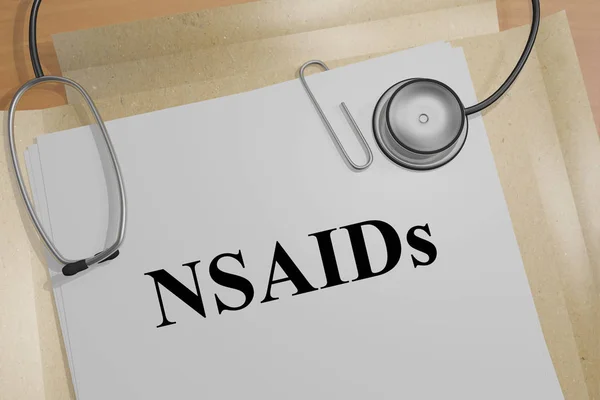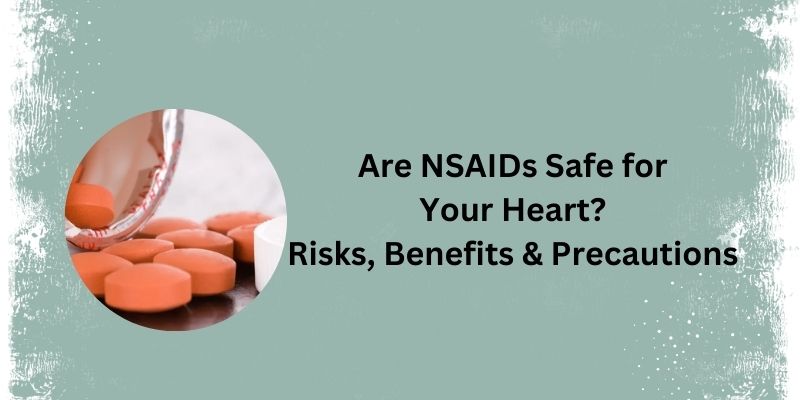How Do NSAIDs Affect Your Heart Health
Nonsteroidal anti-inflammatory drugs (NSAIDs) are a common choice for people these days. They take these drugs for quick relief from pain and inflammation. But guess what? These drugs are increasing heart concerns in many people. Yet, they are taken by many people for their multiple benefits. In this article, we will see how NSAIDs have an effect on the heart and how we can use them safely by avoiding their side effects.
What are NSAIDs?
NSAIDS or nonsteroidal anti-inflammatory drugs help people with their lower pain and reduce inflammation. It also lowers the fever and brings down the body temperature. You can also take them to treat headaches, painful periods, colds, flu, and arthritis. Some NSAIDs can also be bought without a proper description from a doctor, such as ibuprofen (Motrin, Advil) and naproxen (Aleve). But some NSAIDs strictly need a doctor's prescription.

How do NSAIDS work on your body?
MSAIDS basically blocks cyclooxygenase (COX) enzymes, specifically COX-1 and COX-2. These enzymes produce prostaglandins and thromboxanes from arachidonic acid. Prostaglandins induce inflammation and you start having feelings of pain due to this enzyme. Similarly, thromboxanes help in blood clotting, which is an alarming situation. When this drug inhibits the COX enzymes, COX-2 inhibition reduces inflammation, while COX-1 inhibition can cause side effects like gastrointestinal ulcers and bleeding.
Some NSAIDs also affect the lipoxygenase pathway and interfere with G-protein-mediated signal transduction, which leads to analgesic effects.
According to a research,
There is growing evidence that NSAIDs work in the central nervous system (CNS) to increase their effects on the body. This may happen by reducing prostaglandin production, affecting opioid peptides, blocking serotonin release, or inhibiting certain brain receptors.
Types of NSAIDs available in the market
NSAIDs come in two forms: over-the-counter (OTC) and prescription. Over-the-counter NSAIDs can be purchased without a prescription and are used for milder symptoms like headaches, muscle aches, and minor arthritis. The most commonly used OTC NSAIDs are ibuprofen, aspirin, naproxen, etc. In other words, people take these drugs as self-medication when they feel any kind of pain.
On the other hand, prescription NSAIDs are stronger than the OTC options. They are used for more severe and chronic conditions. It is available in different forms, like topical gels and oral tablets. This kind of drug needs a prescription from a doctor. The most common examples are diclofenac, meloxicam, indomethacin and celecoxib.
4 top benefits of NSAIDs
NSAIDs have multiple benefits, due to which they are a common choice for people. Some of the benefits are explained below:
- Pain relief: NSAIDs are most popular for their pain relief ability. They can be used to treat different kinds of pain in the body, such as headaches, toothaches, and muscle aches. They are even used for joint pain in arthritis.
- Anti-inflammatory effects: NSAIDs also help reduce inflammation in the body. They also reduce redness and swelling.
- Reduces fever: NSAIDs also act as effective antipyretics. This means they can effectively reduce fever that occurs during colds, flu, and coughs. In this way, you can also recover quickly from viral and bacterial infections.
- Cost-effective: NSAIDs are mostly easily available in the market and are inexpensive. That's why many people use these drugs to treat milder symptoms.
How can NSAIDS damage the heart?
NSAIDS retain fluid and cause edema, which worsens pre-existing heart failures. They also affect kidney function and decrease renal perfusion and glomerular filtration rate. Due to this, high blood pressure is observed. Moreover, excessive intake of NSAIDs without a doctor's prescription can increase the risk of heart attack and stroke. Some NSAIDs with high COX-2 inhibition, such as diclofenac, seem to have a higher cardiovascular risk. Even short-term use of NSAIDs like ibuprofen, diclofenac, celecoxib, and rofecoxib has been linked to an increased risk of serious coronary heart disease. So, you should always take medicine with a doctor's prescription and in a recommended dose.

Who is at risk with the usage of NSAIDs?
Several factors play a major role in having cardiovascular issues due to NSAIDs are written below:
- People over 45 year
- People with pre-existing heart conditions
- Hypertension
- chronic kidney disease
- peripheral arterial disease
- diabetes
How to use NSAIDs safely
Everything has side effects but can be controlled with the right usage and method. Here's detail about how you can safely use NSAIDs:
- Use the Lowest Effective Dose: Always use the lowest amount of NSAID to reduce your pain without causing any side effects.
- Limit Duration: take NSAIDs only for as long as you need them or as prescribed by your healthcare provider. Prolonged use can lead to serious side effects. If you find that you need to take NSAIDs regularly for chronic pain, consult your doctor immediately.
- Take with food: you can take NSAIDs with food, which can help reduce stomach irritation and gastrointestinal side effects, such as nausea or ulcers.
- Be Aware of Interactions: NSAIDs can interact with different medications. For example, they may reduce the effect of certain blood pressure medications. Similarly, they can increase the risk of bleeding when taken with blood thinners. Always inform your healthcare provider about all you are taking with NSAIDs.
- Consider Alternatives: Find other options, like paracetamol (acetaminophen), for pain relief before starting NSAIDs. Paracetamol is generally considered safer for most people. It does not carry the same risks for heart issues or gastrointestinal problems.
- Avoid Using Multiple NSAIDs Concurrently: do not use multiple NSAIDs at the same time because they increase the chances of cardiovascular issues and other side effects.
Which NSAID is safest for long-term use?
Naproxen is considered one of the safer NSAIDs for long-term use. While all NSAIDs can raise the risk of heart attacks, naproxen has a milder effect. This makes it a preferred option for those concerned about cardiovascular safety.
Celecoxib, a COX-2 selective NSAID, is known for being gentler on the stomach. When taken at lower doses, it may be suitable for long-term use in people with heart risks. However, it is important to consult a doctor before using NSAIDs for chronic pain.
At what age should you stop taking NSAIDs?
There is no fixed age when people must stop taking NSAIDs. However, adults over 65 should be careful. Because NSAIDs can increase the risk of side effects like stomach bleeding, heart issues, and kidney problems. As the body ages, it may not process medications as efficiently.
Final words
NSAIDs are helpful in relieving pain and inflammation. They have several other benefits, too, which make them a popular choice. However, with the proper instructions, we can avoid the side effects and risks of heart issues. Safer alternatives like paracetamol may be a better option for some people. Ultimately, it is always important to take any kind of medicine with a doctor's prescription.












